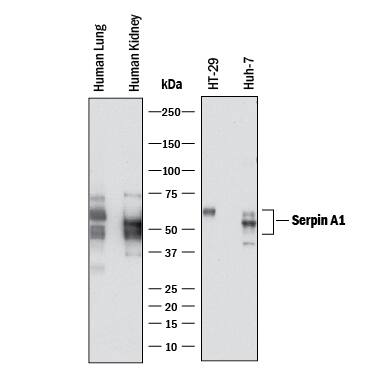Human Serpin A1/ alpha1-Antitrypsin Antibody
R&D Systems, part of Bio-Techne | Catalog # MAB12681


Key Product Details
Species Reactivity
Applications
Label
Antibody Source
Product Specifications
Immunogen
Glu25-Lys418
Accession # P01009
Specificity
Clonality
Host
Isotype
Scientific Data Images for Human Serpin A1/ alpha1-Antitrypsin Antibody
Detection of Human Serpin A1/ alpha1‑Antitrypsin by Western Blot.
Western blot shows lysates of human lung tissue, human kidney tissue, HT-29 human colon adenocarcinoma cell line, and Huh-7 human hepatoma cell line. PVDF membrane was probed with 2 µg/mL of Mouse Anti-Human Serpin A1/a1-Antitrypsin Monoclonal Antibody (Catalog # MAB12681) followed by HRP-conjugated Anti-Mouse IgG Secondary Antibody (Catalog # HAF018). Specific bands were detected for Serpin A1/a1-Antitrypsin at approximately 45-60 kDa (as indicated). This experiment was conducted under reducing conditions and using Immunoblot Buffer Group 1.Detection of Human Serpin A1/a1-Antitrypsin by Simple WesternTM.
Simple Western lane view shows human plasma, loaded at 0.2 mg/mL. A specific band was detected for Serpin A1/a1-Antitrypsin at approximately 65 kDa (as indicated) using 20 µg/mL of Mouse Anti-Human Serpin A1/a1-Antitrypsin Monoclonal Antibody (Catalog # MAB12681) . This experiment was conducted under reducing conditions and using the 12-230 kDa separation system.Applications for Human Serpin A1/ alpha1-Antitrypsin Antibody
Simple Western
Sample: Human plasma
Western Blot
Sample: Human lung tissue, Human kidney tissue, HT‑29 human colon adenocarcinoma cell line, and Huh‑7 human hepatoma cell line
Formulation, Preparation, and Storage
Purification
Reconstitution
Formulation
Shipping
Stability & Storage
- 12 months from date of receipt, -20 to -70 °C as supplied.
- 1 month, 2 to 8 °C under sterile conditions after reconstitution.
- 6 months, -20 to -70 °C under sterile conditions after reconstitution.
Background: Serpin A1/alpha 1-Antitrypsin
Serpin A1 is the archetypal member of the Serpin superfamily of the serine protease inhibitors (1). As one of the most abundant proteinase inhibitors in the circulation, it is synthesized in the liver and secreted into the bloodstream with the major function to protect tissues against neutrophil elastase. A severe Serpin A1 deficiency leads to several clinical complications such as pulmonary emphysema, juvenile hepatitis, cirrhosis, and hepatocellular carcinoma (2). The deficiency is caused by point mutations in naturally occurring Serpin A1 variants (over 70 are known). For example, the Z variant (Glu342 to Lys) forms intracellular inclusion bodies, is not secreted, and leads to a severe Serpin A1 deficiency (3).
References
- Silverman, G.A. et al. (2001) J. Biol. Chem. 276:33293.
- Barbour, K.W. et al. (2002) Genomics 80:515.
- Lomas, D.A. et al. (2002) Biochem. Soc. Trans. 30:89.
Alternate Names
Entrez Gene IDs
Gene Symbol
UniProt
Additional Serpin A1/alpha 1-Antitrypsin Products
Product Documents for Human Serpin A1/ alpha1-Antitrypsin Antibody
Product Specific Notices for Human Serpin A1/ alpha1-Antitrypsin Antibody
For research use only
